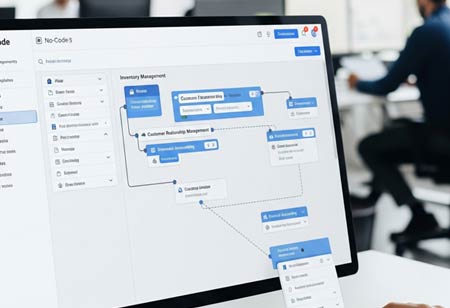THANK YOU FOR SUBSCRIBING
No-Code ERP and the New DNA of Business Resilience
Businesses in APAC must adapt to market volatility; No-Code ERP enables rapid deployment and empowers users, fostering resilience and agility in enterprise management.

By
Apac CIOOutlook | Monday, September 22, 2025
Stay ahead of the industry with exclusive feature stories on the top companies, expert insights and the latest news delivered straight to your inbox. Subscribe today.
In the current volatile APAC landscape, characterized by supply chain disruptions, evolving consumer behaviors, and rapid technological advancements that redefine growth parameters, adaptability has emerged as the cornerstone of business survival. Business resilience—defined as the capacity to anticipate, withstand, and flourish amidst disruption—has become the primary objective for enterprises of all scales. Central to this new paradigm is a transformative technological shift: No-Code Enterprise Resource Planning (ERP). This evolution in enterprise management is enabling APAC businesses to attain unparalleled agility, cultivating a future where resilience is not merely an aspiration but an intrinsic attribute of their operational framework.
Agility in a Fluctuating Market
Conventionally, the enterprise technology meant to support and streamline these operations has often been more of a hindrance than a help. Traditional ERP systems, with their monolithic structures and rigid architectures, were designed for a world of stability and predictability. Their implementation cycles are notoriously long, often spanning months or even years, and require significant capital investment and reliance on specialized technical expertise. Customizing or adapting these legacy systems to new business processes is a complex, costly, and time-consuming endeavor. In a market that demands swift action, this inherent inflexibility can be a fatal flaw, leaving businesses unable to respond promptly to threats or seize opportunities. The chasm between the speed of business and the speed of traditional technology has never been wider, creating a critical need for a more dynamic and responsive approach to enterprise management.
Democratizing Innovation with No-Code Platforms
No-Code ERP represents a fundamental departure from this traditional model. At its core, it is a visual approach to application development, utilizing intuitive drag-and-drop interfaces, pre-built modules, and graphical workflows. This paradigm shift effectively democratizes the power of creation, moving it from the exclusive domain of professional developers into the hands of the business users who are closest to the problems themselves. These "citizen developers"—process owners, department heads, and business analysts—can now design, build, and modify enterprise-grade applications without writing a single line of code.
This empowerment is the cornerstone of the No-Code revolution. It fosters a culture of bottom-up innovation, where those with the most profound understanding of a business process are equipped with the tools to improve it. Instead of translating a need to an IT department and waiting in a long development queue, a business leader can conceptualize and deploy a solution in a fraction of the time. This accelerates problem-solving, streamlines workflows, and ensures that the technology aligns perfectly with the organization's real-world operational needs. The focus shifts from managing a rigid system to continuously optimizing a flexible one, creating a living, breathing technological ecosystem that evolves in lockstep with the business.
Rapid Deployment: The Engine of Resilience
The single most significant advantage of No-Code ERP in volatile markets is the sheer speed of deployment. What once took years of planning, coding, and testing can now be accomplished in weeks or even days. This radical acceleration is a game-changer for business resilience. When a new market opportunity emerges, a company can rapidly configure and launch the necessary operational workflows to capitalize on it. When a supply chain disruption occurs, new logistics processes and partner integrations can be built and deployed almost instantaneously to mitigate the impact.
This capacity for rapid deployment enables an organization to transition from a reactive entity to a proactive one. The ability to quickly stand up new processes or modify existing ones allows a business to conduct real-world experiments, test new models, and iterate based on immediate feedback. This iterative approach—build, measure, learn—is fundamental to navigating uncertainty. Instead of placing large, high-risk bets on a single, long-term technology project, businesses can make more minor, incremental changes, adapting and refining their approach as the market landscape evolves. This agility, powered by the rapid deployment capabilities of No-Code platforms, is the very essence of a resilient enterprise. It is the ability not just to weather the storm, but to harness its energy for growth and innovation.
The role of No-Code ERP in the APAC region is set to expand dramatically. It is the enabling technology for what is often referred to as the "composable enterprise." This is a vision of an organization built not from a single, monolithic system, but from a collection of interchangeable and interconnected applications and capabilities. Businesses will be able to assemble their own bespoke ERP solutions by selecting and configuring modules for finance, human resources, supply chain management, and customer relationship management, all from a unified No-Code platform. This modular approach offers the ultimate flexibility, enabling an enterprise to add, remove, or modify capabilities with ease and simplicity.
As this trend progresses, these platforms are poised to become even more sophisticated, seamlessly incorporating artificial intelligence, machine learning, and the Internet of Things (IoT). This integration will unlock novel opportunities for automation and data-driven decision-making, thereby further enhancing a business's ability to anticipate market trends and respond proactively. The trajectory of enterprise management within the APAC region will shift from the procurement of monolithic, universally applicable solutions to the cultivation of a highly adaptable technological infrastructure.
The inherent volatility of regional markets necessitates the emergence of a novel enterprise paradigm: one characterized by agility, adaptability, and intrinsic resilience. Conventional, code-intensive ERP systems prove inadequate for this contemporary reality. The future is predicated upon the velocity, versatility, and empowerment afforded by No-Code platforms. By directly empowering business users with creative capabilities and facilitating the expeditious deployment of customized solutions, No-Code ERP transcends mere technological advancement; it represents a foundational philosophy for cultivating resilient organizations poised to flourish amidst continuous change.





